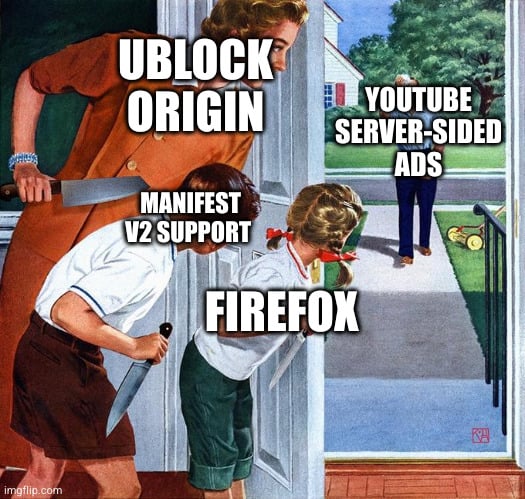this post was submitted on 10 Oct 2024
976 points (97.8% liked)
memes
10973 readers
3664 users here now
Community rules
1. Be civil
No trolling, bigotry or other insulting / annoying behaviour
2. No politics
This is non-politics community. For political memes please go to !politicalmemes@lemmy.world
3. No recent reposts
Check for reposts when posting a meme, you can only repost after 1 month
4. No bots
No bots without the express approval of the mods or the admins
5. No Spam/Ads
No advertisements or spam. This is an instance rule and the only way to live.
Sister communities
- !tenforward@lemmy.world : Star Trek memes, chat and shitposts
- !lemmyshitpost@lemmy.world : Lemmy Shitposts, anything and everything goes.
- !linuxmemes@lemmy.world : Linux themed memes
- !comicstrips@lemmy.world : for those who love comic stories.
founded 2 years ago
MODERATORS
you are viewing a single comment's thread
view the rest of the comments
view the rest of the comments

I assume something similar to sponsor block, some algorithm to identify ad segments and some user feedback to confirm. Unless I’m mistaken as to how sponsor block works?
Sponser block works via user input
People will watch the videos, report the segments that are sponser slots, and then when people watch the video they can upvote or downvote the accuracy of the report.
In stream ads would be a hard one to tackle because YouTube would likely inject them randomly into the stream to boost engagement (readas, prevent people skipping them easily).
if they were randomly placed, then couldnt you have a sponsor-block type system where instead of the ad segments being marked and skipped, information about the video is externally stored somewhere (like perhaps a really low res screenshot of the video every couple seconds, or some number generated algorithmically by a frame of video), and the results should be the same for all users for the actual video part, but if the ads are placed randomly, the ad section will suddenly not match the data other users had, prompting the video to skip until it matches again (with a buffer included if they remove the ability to move forward)
You don't need anything so complicated.
Take two copies of the same video, diff them and only keep the parts that match.
We can also build up a database of as signatures to automatically identify them without requiring a watermark - we already have the technology to do this for detecting intro sequences for skipping.
In that case the ads are video only, no clicking on them, including to skip or anything else. So it would be detecting that trying to change where you are in the video doesn't change anything (and exclusively playing via your 3 second buffer)